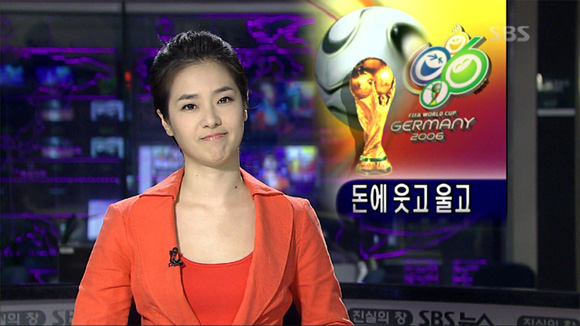 영어토론방 영어토론방 | Home>영어토론방 |
Culture Is SBS being a bully with World Cup TV rights?
페이지 정보

본문

Avid soccer fan Lim Hae-jin, 29, has a bit of headache these days.
Lim wants to watch Korea’s World Cup opening game with her co-workers.
However, it’s not so easy to find a place to do so, Im said.
“Last time (the 2006 World Cup) we went to a nearby pub to watch the match together.
They had a pretty big screen. However, this time they said they had no plans to show the games,” said Lim.
The 2010 World Cup, which kicks off on June 11, is only two weeks away. Unlike four years ago, however, there are not many signs and displays at pubs, restaurants and hotels about screenings of the games.
Park Hyatt spokeswoman said the hotel recently canceled a plan to show live matches on wide screen at their bar after receiving a letter from SBS, a commercial broadcaster which holds exclusive broadcast rights to the 2010 World Cup.
To show any of the World Cup matches in public places, including pubs, bars or restaurants, one should buy “Public Exhibition Right,” from SBS, the broadcaster noted in a document sent out last week to major hotels and restaurant chains in the country.
The prices vary depending on location, spectator capacity and also objectives. Non-commercial exhibition rights are priced at 1 million won ($817) to 10 million won, but for commercial purposes it can cost up to 100 million won, according to SBS.
“We are entitled to collect the fee on behalf of FIFA,” said Sung Baik-you, the manager of Sports marketing at SBS.
However, according to FIFA’s regulations for viewing exhibitions, the prices are slightly different. The license fees for commercial usage start at $1,000 and run up to $14,000.
“It can be quite tricky to judge whether the viewing is for profit or not as there are no clear rules in FIFA’s regulations,” said Sung.
Asked whether SBS is imposing extra charges, Sung did not deny it but gave no details.
“So far five places have bought the exhibition rights from us, and hundreds more have shown interest,” Sung said.
He added that FIFA, the world football governing body, strongly advised their main broadcasters, including SBS, to monitor World Cup coverage so that it is not used without.
“We’re thinking of hiring monitoring personnel during the World Cup,” he said.
“I don’t know anything about FIFA’s rules or conditions. All I know is the World Cup is meant to reunite people across the world,” said Lim. “If SBS is making it hard for people to watch the World Cup together, I don’t think they are doing the right thing.”
SBS announced Tuesday that it will be the sole broadcaster of the 2010 World Cup in Korea, declaring that negotiations with rivals MBC and state-run broadcaster KBS are officially over.
The commercial broadcasting company secured exclusive contracts with FIFA in 2006 for the 2010 and 2014 World Cups.
They also signed exclusive deals with the International Olympic Committee in 2006 to air the 2010 and 2014 Winter Games and also the 2012 and 2016 Summer Olympics.
The move sparked harsh a backlash from the two rival TV broadcasters, which claimed that SBS had violated their agreement, called “Korea Pool,” to share broadcasting rights for global events. MBC and KBS are considering taking court action for charges of obstruction of business.
SBS is planning to air all 64 games of the 2010 World Cup in South Africa -- 56 matches will be on air live on its main channel and eight games will be shown on its affiliate channel SBS Sports.
Excerpt from The Korea Herald
Source: http://www.koreaherald.com/sports/Detail.jsp?newsMLId=20100526000779
Question
1. Did you watch the World Cup games? Tell us how you felt.
2. How could SBS have the exclusive rights for the World Cup?
3. There are both merits and demerits of the exclusive broadcasting. Think about it.
4. Do you agree or disagree with the fact that one broadcasting company broadcasts the World Cup or
the Olympics exclusively.
이 글은「대학연합영어토론동아리」www.pioneerclub.com에서 제공하는 영어토론 정보입니다.
댓글목록
등록된 댓글이 없습니다.

